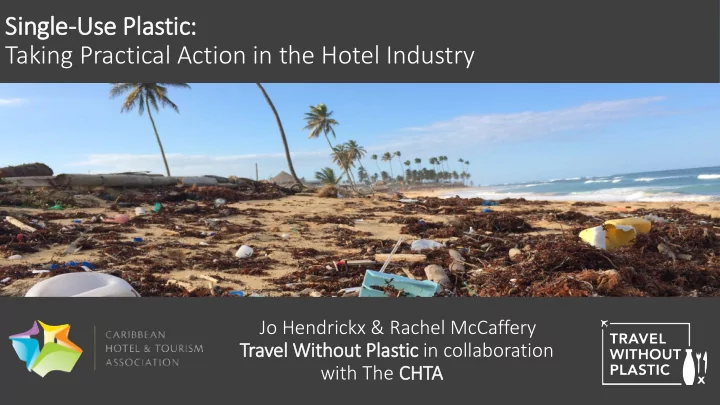

Singl gle-Us Use P Plastic: Taking Practical Action in the Hotel Industry Jo Hendrickx & Rachel McCaffery Travel W l Without P Plastic ic in collaboration with The CHTA TA
Jo Hendrickx Rachel McCaffery Founder & CEO Bu siness Development Director
Today’s Focus: 1.The scale of single-use plastic in tourism 2.The financial and environmental impact 3.Pitfalls and Considerations 4.Practical actions for hotel managers 5.Q&A References for any research mentioned during the presentation will be available in the slide deck
300 million tonnes of plastic is produced every year
• Group of 10 hotels • 6.6 million single-use items • All-Inclusive and half board • 1 million of which add no value • 85 – 90% occupancy over 12 months • Saving $12,500 per year 15% of single-use plastics were completely unnecessary
Sometimes the challenges are very difficult to overcome
REASONS Health, Safety, Minimise injuries at pool side and/or on the beach, minimise incidences of cross contamination, concerns around safe tap water Hygiene Habit Bathroom amenities, cups wrapped in plastic, plastic wraps informing that the toilet is clean Convenience Take-Away options - less space required in dining areas, easy to clear away, no requirements for dishwashing or storage, keeps buffets clean and tidy No need to pay additional staff to clear, wash, stack and prepare reusable items Staff Cost, availability, usability, infrastructure Alternatives
• Infrastructure for bio-plastics • Unforeseen impacts of alternatives (environmentally and ethically) • Not everything is as green as it seems • Bio-degradable alternatives have a limited shelf life • Tour Operators may consider that some alternatives clash with current H&S expectations • Ask wholesalers and suppliers for help in sourcing alternatives • Speak to suppliers about reducing unnecessary packaging Pitfalls and Considerations • Support your own economy and reduce carbon associated with transport
UNITED NATIONS ENVIRONMENT • Straws, utensils, bags and foam containers are amongst the most popular items banned by a range of Caribbean Be Prepared for islands including Dominica, Jamaica, Turks and Caicos, Haiti, St. Vincent and The Grenadines, a move publicly Legislation & Trends supported by the UN Environment • EU to ban single-use plastic plates, straws, cutlery, polystyrene fast-food containers, ear-buds, coffee cups by 2021
Preparing for legislation, and trends, what are your options? Eliminate Unnecessary plastics that add no value to the customer experience and cost money that your business doesn’t need to spend Choose Reusable Select from a range of reusable alternatives, including plastics, bamboo, silicon, stainless steel, aluminium, fabric – always considering the full natural capital cost of those replacements Sustainable Single-Use Consider organic based alternatives that do break down naturally and are not harmful to environments
Know your Baseline 3 Phase Approach to Engage Staff and Guests Reducing Plastic Implement and Evaluate
How can you reduce or eliminate plastic from your operations? Phase 1 – Knowing your baseline • Be clear on how much single-use plastic your business purchases and how much it costs • Identify any completely unnecessary items and commit to eliminating them • Identify any pending legislation that may require you to prioritise particular items • Identify a further top 3, 5 or 10 single-use plastic items that you believe can make the biggest impact (environmentally and financially)
How can you reduce or eliminate plastic from your operations? Phase 2 – Engaging Others • Invite department heads to a meeting table and share with them the statistics from your cost/consumption exercise • Discuss the potential impacts that any changes would have upon workload, customer satisfaction, current processes, disposal etc • Agree a procedure for implementing changes • Agree a set of customer communications • Make enquiries with suppliers/wholesalers to gain support for your objectives
How can you reduce or eliminate plastic from your operations? Phase 3 (Implementation & Evaluation) • Trial a range of new products for usability, customer feedback and staff feedback before making a final decision • Monitor and record the impacts • Keep abreast of any new, impending legislation • Keep up to date with innovative alternatives as they come into the market place.
If waste reduction suddenly became the key target for your purchasing department, what would you identify as priority actions for 2019?
Identify Identify where plastic is used in your hotel Calculate the total number of plastic items used and the 10% discount Calculate associated cost for CHTA Engage staff with training presentations and guests with Engage communications guidance members* Accelerate change and reach your goals more quickly if Accelerate you've already taken the first steps Receive Receive updates when new alternatives hit the market Be featured in our portfolio of hotels working to reduce Feature Offer valid until 30 th April 2019 single-use Be counted towards our goal of reducing single-use Count plastic items by ONE BILLION by 2020
Singl gle-Us Use P Plastic: Taking Practical Action in the Hotel Industry Q & A
Website: https://www.travelwithoutplastic.com Email: info@travelwithoutplastic.com Telephone: 0034 611 42 36 42 (GMT)
References Plastics Europe ATTA Research EU Single-Use Plastic Ban 2021 Other Plastic Bans Booking.com 2019 Trends Free Introduction to reducing/eliminating bathroom amenities UN Environment supports plastic bans in the Caribbean
Recommend
More recommend